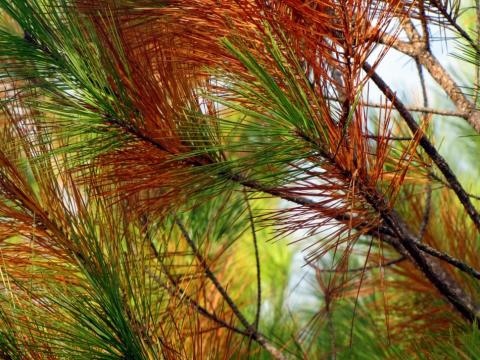Do pine trees and pine needles make soil more acidic?

A very common gardening myth is that pine trees and the needles they drop acidify the soil. While it’s true that the soil near pines is often quite acidic, the soil pH was not determined by the tree. Eastern white pine (Pinus strobus) is one of the dominant forest tree species in much of New Hampshire, and it grows best in places with acidic, well-drained soil. Pines grow where they do because the soil and climate are suitable, and they are not creating acid conditions themselves. When nothing grows beneath a white pine tree, it is probably because the tree has numerous shallow roots and is casting too much shade.
Benefits of Using Pine Needles As Mulch
Pine needles themselves are acidic but do not have the capacity to appreciably lower the soil pH. To do that, it is necessary to incorporate a soil acidifier such as sulfur or aluminum sulfate. If you are unsure of the pH in your garden, you should have the soil tested. As pine needles break down and are incorporated into the soil, decomposing organisms gradually neutralize them. Thus, there is no harm in using pine needles to mulch shrub borders, flower beds and vegetable gardens. Even a 2 to 3 inch layer of pine mulch will not change the soil pH enough to measure.
There is a long list of benefits to using pine needle mulch, including that it is free and often readily available. Pine needles provide all the advantages of any other mulching material, including conserving soil moisture, suppressing weeds, adding soil nutrients, moderating soil temperature and keeping plants and fruit clean during heavy rains. Additionally, pine needles have a tendency to stay loose and light, not forming an impenetrable crust like wood mulch. They are quite stable and do not tend to wash out of beds during heavy rains. In spots where it is difficult to keep mulch in place on a slope, pine needles may be the answer. Finally, pine needles are longer lasting than other types of organic mulch, and their fine texture is quite attractive against most permanent plantings.
If you have a pine tree in your yard, start taking advantage of fallen needles. They are a free mulch and will benefit your garden.
Got questions? The Ask UNH Extension Infoline offers practical help finding answers for your home, yard, and garden questions. Call toll free at 1-877-398-4769, Monday to Friday, 9 a.m. to 2 p.m., or e-mail us at answers@unh.edu.
Related Resource(s)
Do you love learning about stuff like this?
SUBSCRIBE TO Granite State Gardening newsletter
Got questions? The UNH Extension Yard and Garden Infoline offers practical help finding answers for your yard and garden questions.
Call toll free at 1-877-398-4769, Monday to Friday, 9 a.m. to 2 p.m., or fill out webform.
